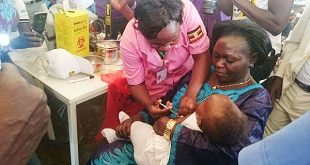
Kampala, Uganda | THE INDEPENDENT | HIV targets set for 2020 will not be reached owing part to deeply unequal access to antiretroviral therapy and service disruptions caused by the COVID-19 pandemic. This is according to a report released by the Joint United Nations Program on HIV and AIDS- UNAIDS, giving a global update on the progress countries are making to eliminate HIV.
The report – Seizing the Moment – warns that the remarkable achievements made in the fight to end AIDS have not been shared equally within and between countries. Only 14 countries in the world have met the 90-90-90 targets, yet there is no sign to show that a majority of the countries will make progress by the end of 2020, a situation which threatens decades of hard-won gains in the fight against HIV.
The 90–90–90 targets envision that, by 2020, 90 percent of people living with HIV will know their HIV status, 90 percent of people who know their HIV-positive status will be accessing treatment and 90 percent of people on treatment will have suppressed viral loads.
But the world is far behind in preventing new HIV infections, the report finds. Some 1.7 million people were newly infected reflecting more than three times the global target. Women and girls in sub-Saharan Africa continue to be the most affected accounting for 59 percent of all new HIV infections in the region.
In 2019, 4,500 adolescent girls and young women between 15 and 24 years old in countries across sub Saharan Africa became infected every week according to the report. Despite making up only 10 percent of the population there, young women accounted for 24 percent of new HIV infections.
An estimated 10.8 million people in the world will not be on ARV treatment to have their viral loads suppressed while another 3.3. million people will not know their HIV status.
Such missed targets have resulted in more than 3.5 million HIV infections and 820,000 AIDS-related deaths since 2015 than if the world was on track to meet the 2020 targets. And the global AIDS response could be set back by 10 years or more if COVID-19 disrupts HIV services.
While addressing a virtual press briefing on Monday ahead of the release of the report, Winnie Byanyima, the Executive Director of UNAIDS said that many countries will not meet their targets because many people in society still cannot access medical care due to discrimination.
According to Byanyima, if some minorities are not able to access medical services, HIV will not be defeated.
While the report shows that some gains have been made in the world like the meeting of the global target by some African countries and the reduction of new HIV infections by 38 percent since 2010, in other parts of the world, the opposite has been seen.
In other parts of the world like Eastern Europe and Central Asia, increases in HIV infections as high as 72 percent have been recorded. New HIV infections have also risen in the Middle East and North Africa by 22 percent and by 21 percent in Latin America.
Byanyima says that with such figures, more needs to be done. She says that countries need to invest more in providing easily accessible health care.
“Every day in the next decade, decisive action is needed to get the world back on track to end the AIDS epidemic by 2030. Millions of lives and new infections have been saved by the scale-up of antiretroviral therapy. However, 690 000 people died of AIDS-related illnesses last year and 12.6 million of the 38 million people living with HIV were not accessing the life-saving treatment,” Byanyima, said.
Uganda is one of the many countries that will not be able to meet its 2020 target. According to the report, only 89 percent of all Ugandans will know their HIV status by the end of 2020. Within the East Africa bloc, South Sudan is the worst-performing standing at 27:68:80 for the 90’s while Rwanda is the best performing at 87:97:91.
******
URN
 The Independent Uganda: You get the Truth we Pay the Price
The Independent Uganda: You get the Truth we Pay the Price


